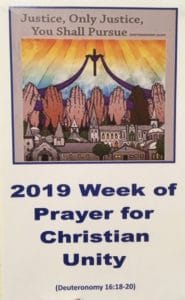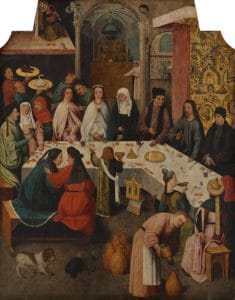On this Second Sunday of Ordinary Time we share a not so ordinary Franciscan Gospel reflection and questions written by Fr. Paul Gallagher, OFM. They are edited by Franciscan Sister of Christian Charity Sister Anne Marie Lom and Joe Thiel. The excerpts from the Sunday readings are prepared by Joe Thiel. To read or download the complete pdf with excerpts for your prayer, please click here: Franciscan Gospel Reflection January 20 2019. Excerpts are from the Lectionary for Mass for Use in the Dioceses of the United States of America, second typical edition © 2001, 1998, 1997, 1986, 1970 Confraternity of Christian Doctrine, Inc., Washington, DC. Used with permission. All rights reserved. No portion of this text may be reproduced by any means without permission in writing from the copyright owner. Please include this information when printing.
Photos: By After Hieronymus Bosch – collectie.boijmans.nl : Home : Info : Pic, Public Domain, https://commons.wikimedia.org/w/index.php?curid=2588619
John 2:1-11
There was a wedding in Cana in Galilee, and the mother of Jesus was there. Jesus and his disciples were also invited to the wedding. When the wine ran short, the mother of Jesus said to him, “They have no wine.” Jesus said to her, “Woman, how does your concern affect me? My hour has not yet come.” His mother said to the servers, “Do whatever he tells you.” Now there were six stone water jars there for Jewish ceremonial washings, each holding twenty to thirty gallons. Jesus told them, “Fill the jars with water.” So they filled them to the brim. Then he told them, “Draw some out now and take it to the headwaiter.” So they took it. And when the headwaiter tasted the water that had become wine, without knowing where it came from (although the servers who had drawn the water knew), the headwaiter called the bridegroom and said to him, “Everyone serves good wine first, and then when people have drunk freely, an inferior one; but you have kept the good wine until now.” Jesus did this as the beginning of his signs in Cana in Galilee and so revealed his glory, and his disciples began to believe in him. After this, he and his mother, (his) brothers, and his disciples went down to Capernaum and stayed there only a few days.
BACKGROUND
John’s gospel is written after the fall of the temple in Jerusalem. Up until this time, many of the early Christian Jews had kept their belief in Jesus secret, so that they could still worship at the temple and maintain their relationships with their Jewish neighbors and family. Now that the temple had been destroyed, many thought it was time for these people to commit to being followers of Jesus and openly part of the Christian community.
John’s gospel is rich with symbolic images. Verse 11 states that this was the first of Jesus’ signs. There are seven signs in John’s gospel; each one points beyond the event itself to a deeper understanding of Jesus’ significance. The last and greatest sign was to be his death and resurrection.
Another way that John links this event with the death and resurrection is through Jesus’ reference to his “hour” in verse 4. Throughout John’s gospel, “the hour” is used as the hour of Jesus’ death and resurrection. (2:4, 4:21, 5:25, 5:28, 7:30, 8:20, 12:23, 12:27, 13:1, 16:4, 16:21, 16:25, 16:32, 17:1, and 19:27)
In the Hebrew Scripture, the wedding banquet itself is a rich symbol for the final fulfillment of God’s relationship with the chosen people. Within this tradition, God is often described as the bridegroom.
The large water jars were on hand so the guests could perform purification rituals. Jesus asks that the jars be filled with water and taken to the headwaiter. The water had been transformed into the finest of wines. At the Last Supper, Jesus will take the wine and transform it into his own blood, which will be poured out on the cross in the purest of sacrific es.
es.
Jesus’ response to his mother in verse 4 as “woman” may sound a bit harsh. However, in their time, this was a customary and respectful way to address a woman, and it was used by Jesus again in other places in the gospel. At the same time, to refer to one’s mother with this title without further amplification would have been unusual. Young men in this culture sought emotional independence from women in general, and especially from their mothers, and they rejected their mothers’ claims on them. This would be particularly true in public situations like the one described at the wedding feast. In this light, the behavior of both Mary and Jesus is very counter-cultural. For Mary to then tell the servants to do whatever Jesus asked of them suggests that she knew another part of her son Jesus. Jesus’ responses to Mary and to the needs of the culture after his initial comment to his mother also demonstrate his inner strength.
REFLECTION QUESTIONS
1. Think of large international family gatherings that include cousins, spouses, and other family members. What roles do different family members play in order for these celebrations to go smoothly?
2. When you think of the last wedding you attended, the things that most strike you were…
3. Are you aware of events in your life that symbolically turned out to be much more important than you or others realized at the time they were happening?
4. If you were one of Jesus’ early disciples and overheard his mother say to him that they have run out of wine, you might have whispered to the disciple sitting next to you…
5. As the events unfold and you see Mary go over to the steward, you would begin to wonder…
6. When Jesus goes over and addresses the steward, you are thinking to yourself…
7. Finally as the celebration continues and you taste the new wine that has just been poured, you begin to think…
8. Can you take some time now to talk to God about Jesus’ relationship to his mother, his apparent reluctance to do anything at this point to draw attention to himself, or some other thought or feeling that arose within you from this text?



